Where to buy
PelletedFeed
Chinchillas need to have a diet that meets their specific needs. A high fiber, low protein, low fat diet is best for chinchillas. This can be achieved with the right pelletted feed and hay. The pelletted feed needs to contain the following items within the specified ranges. Too little or too much of any of these items can cause health issues. If the feed does not fall within these guidelines, find a feed that does. Please note: most brands of feed sold in pet stores that are labeled for chinchillas do not meet these guidelines and are actually unhealthy for chinchillas.
| Protein | 16% - 20% |
| Fiber | 16% - 23% |
| Fat | 2.5% - 3.5% |
| Vitamin A | 3,000 - 28,500 IU/lb |
| Ash | 9.6% or lower |
| Calcium | 0.7% - 1.6% |
| Salt | 0.25% - 1.0% |
| Phosphorus | 0.25% - 0.8% |
Corn or corn products, dairy, honey, nuts, seeds, vegetables and fruits of any kind should not be in the ingredients. Also, these items should not be used as treats. The digestive system of the chinchilla is not designed to handle any of these items. Avoid any pelletted feed that has treats such as dried fruits, vegetables, nuts or seeds mixed into it. These items are not healthy for chinchillas and the chinchillas will pick out the treats and leave the pellets behind. Below left is an example of an unhealthy feed for chinchillas. It is loaded with treats, fruits, vegetables, nuts and seeds. All of which should not be fed to chinchillas. Below right is a picture of a quality feed. Note the lack of added treats.
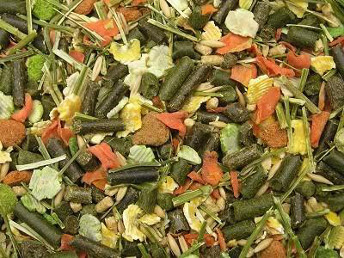 Unhealthy feed
Unhealthy feed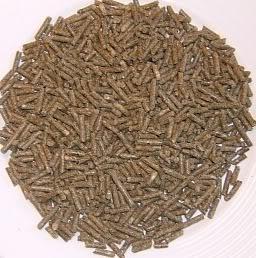 Pelleted Feed
Pelleted FeedFeed should be kept in a clean, dry, and cool location, in sealed containers. It should be used before it is six months old. After that, the feed loses its nutritional value. Mill dates should be printed on the bag. Be sure to check the mill date prior to buying the feed. If there is no mill date, the feed should not be purchased.
Transitioning from one Feed to Another
When switching from one good feed to another, it is advised to make the change gradually over the period of 4 weeks. This will lessen the impact of the change and help to prevent any digestive upset.
First, be sure that the new feed is of good quality, according to the guideline previously discussed. Once the new feed is selected, a slow transition is usually recommended. This can be accomplished by mixing the old feed with the new feed. Follow the schedule below to slowly transition the chinchilla from one feed to the other.
| Week 1 | Mix 1 part(25%) new feed with 3 parts (75%) old feed |
| Week 2 | Mix 2 parts(50%) new feed with 2 parts (50%) old feed |
| Week 3 | Mix 3 parts(75%) new feed with 1 part (25%) old feed |
| Week 4 | 100% new feed |
 A standard Grey Chichilla
A standard Grey ChichillaIf the chinchilla is currently on a poor quality feed or has issues such as soft stools from the feed they are on, it is recommended to switch to the new feed “cold turkey”. This means that the old feed is thrown out and the new feed is offered immediately, no mixing. There is no point in slowly transitioning from a feed that is making the chinchilla sick. In fact, a slow change would just prolong the chinchilla’s illness. Acidophilus should be given anytime a “cold turkey” switch is done.
Hay
Chinchillas should have access to hay or hay cubes at all times. Most chinchilla feed is made of alfalfa so the chinchilla should be offered timothy hay. If the pelletted feed is made of timothy, then alfalfa hay should be offered. Hay serves two purposes. It is high in fiber and it requires a good deal of chewing to eat it. The fiber content keeps the chinchilla’s digestive system working properly and the coarse texture helps keep the chinchilla’s teeth worn to the proper length.
Make sure that the hay is of good quality before feeding it to the chinchilla. If the hay is old, moldy, or dusty, it should not be used. Good hay smells sweet and is green in color. Hay that smells or looks moldy should not be used. It can cause serious illness if fed to a chinchilla. If the hay is brown or yellow, it is too old and has lost much, if not all, of its nutritional value. Dusty hay can have contaminants that could harm or kill a chinchilla. Never feed hay that has been sprayed with insecticide. Below is a picture of a good quality timothy hay.
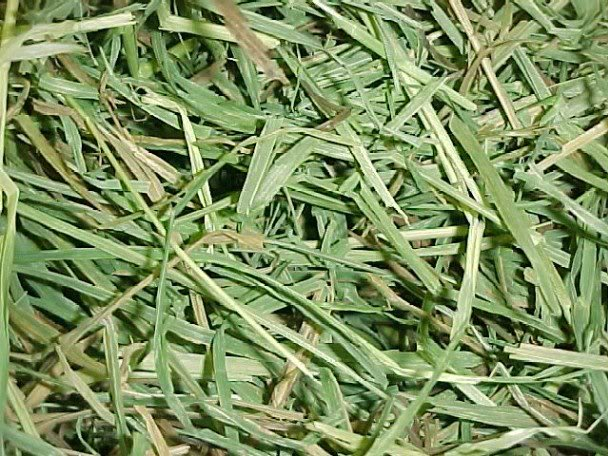 Second Cut Timothy hay
Second Cut Timothy hayThe following is a list of recommended feeds and hay for chinchillas. Each of the feeds in this list meets the requirements for a high quality feed for chinchillas. Please note that some of these feeds are for rabbits. Not all rabbit food is good for chinchillas. The rabbit feeds in this list meet the aforementioned requirements for chinchillas. Links to the companies’ websites have been provided for your convenience.
Pellets
Oxbow
Mazuri
Tradition
American Pet Diner(APD)
Pen Pals Professional Rabbit 18%
Klien Diet and Supplement
Purina Rabbit Chow Show Formula(PRCS)
Manna Pro Show Rabbit Pellets
Nutrena Naturewise Rabbit Pellets
Mazuri
Tradition
American Pet Diner(APD)
Pen Pals Professional Rabbit 18%
Klien Diet and Supplement
Purina Rabbit Chow Show Formula(PRCS)
Manna Pro Show Rabbit Pellets
Nutrena Naturewise Rabbit Pellets
http://www.oxbowhay.com
http://www.mazuri.com
http://www.hubbardfeeds.com
http://www.americanpetdiner.com
http://www.admani.com/rabbit/rabbitindex.html
http://www.purinamills.com
http://www.mannapro.com/products/rabbit/select-series-feed/
http://www.nutrenaworld.com
http://www.mazuri.com
http://www.hubbardfeeds.com
http://www.americanpetdiner.com
http://www.admani.com/rabbit/rabbitindex.html
http://www.purinamills.com
http://www.mannapro.com/products/rabbit/select-series-feed/
http://www.nutrenaworld.com
Hay
Oxbow
American Pet Diner(APD)
Kleenmamma's
Most feed manufacturers have store locators on their websites. Some forums have a supplies section in their classified ads where members sell many of the recommended feeds for less than the pet stores. Some of these feeds can only be purchased at feed stores or online. American Pet Diner(APD)
Kleenmamma's
Hay can also be purchased from feed stores and local farmers.
Both Oxbow and Mazuri can be found at PetSmart.


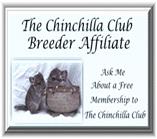
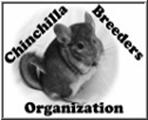 Site Last Updated on December 31, 1969 05:00 pm
Site Last Updated on December 31, 1969 05:00 pm